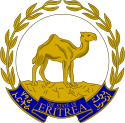Our website is made possible by displaying online advertisements to our visitors.
Please consider supporting us by disabling your ad blocker.
National Assembly (Eritrea)
National Assembly ሃገራዊ ባይቶ Hagerawi Baito | |
|---|---|
 | |
| Type | |
| Type | |
| History | |
| Founded | 1 February 1994 |
| Disbanded | 2 February 2002 (de facto)[1] |
| Leadership | |
President of the Assembly | |
| Structure | |
| Seats | 150 members (75 appointed, 75 elected from the PFDJ) |
 | |
Political groups | PFDJ (75) Appointed (75) |
| Meeting place | |
| Asmara | |
 |
|---|
| Constitution (not enforced) |
| Elections |
|
|
The National Assembly (Tigrinya: ሃገራዊ ባይቶ, romanized: Hagerawi Baito) of the State of Eritrea has 150 members, 75 members appointed (consisting mostly of representatives elected by the general population, of whom at least 11 must be women, and 15 members representing Eritreans living abroad) and 75 members representing the members of the Central Committee of the People's Front for Democracy and Justice (PFDJ), the sole legal political party of Eritrea.[2] According to the IPU, the National Assembly has 150 indirectly elected members. The National Assembly was composed in 1994, and its meeting place is located in Asmara.
AFP reported that Eritreans have elected 399 representatives in the country's six regions in a lengthy process that would lead to the formation of a constituent assembly, with the regional elections beginning on 4 January 1997 in some parts of the country and completed in others by 1 March 1997.[citation needed] As of 2024[update], direct elections had never been held: elections planned for 2001 were continuously postponed before being cancelled altogether. As of 2016[update], the National Assembly was described by the Office of the United Nations High Commissioner for Human Rights as non-existent,[3] having not convened since January 2002.[4] In practice, President Isaias Afwerki exercises legislative powers in addition to the executive functions granted by the constitution.
- ^ "02.02.02 Eritrea's Day of Shame". Retrieved 2022-11-22.
- ^ "Eritrea - Political structure". Archived from the original on 2016-11-14. Retrieved 2016-11-24.
- ^ Cite error: The named reference
OHCHR_ER_crimes_humanitywas invoked but never defined (see the help page). - ^ "Democracy according to Eritrea's Afwerki, then and now".
Previous Page Next Page
المجلس الوطني الإرتري Arabic Nationalversammlung (Eritrea) German Assemblée nationale (Érythrée) French האספה הלאומית של אריתריאה HE Majelis Nasional (Eritrea) ID Assemblea nazionale (Eritrea) Italian 国民議会 (エリトリア) Japanese Nationale Vergadering (Eritrea) Dutch Eritreas nasjonalforsamling NB Парламент Эритреи Russian


